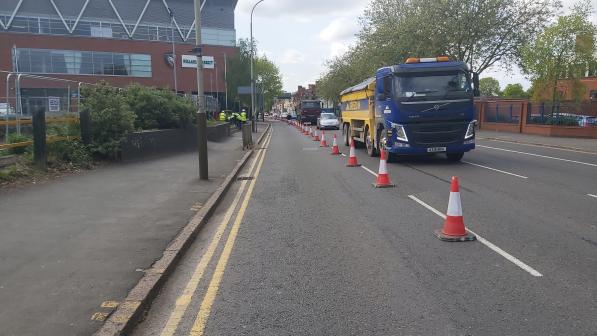100 miles of pop-up cycle lanes could enable millions to cycle safely post-lockdown

- Cycling UK commissioned research shows how 100 stretches of road in 10 English cities could make cycling and walking easier post-lockdown
- Transport Secretary says cycling and walking “can be a very important part” of the UK’s post-lockdown recovery
The charity is calling on government to support and encourage local authorities to start installing temporary cycle lanes and wider pavements across all cities and towns in preparation for the UK’s post-lockdown recovery. A Cycling UK campaign calling on councils to start building pop up cycle lanes, has so far seen 5,551 members of the public write to their councillors in support.
To assist councils across England, the charity has commissioned research showing where 10 cities, including Manchester and Birmingham, could place pop up cycle lanes that will allow the most people to cycle safely to work while also maintaining social distancing.
Duncan Dollimore, Cycling UK’s head of campaigns said:
“The last thing we want when lockdown ends is everyone jumping into their cars to drive to work because they’re concerned about taking public transport. Pop up cycle lanes and widened pavements are cheap and easy to implement solutions which will allow millions to move in safety, not just from the risks of motor traffic but also from the risks of catching coronavirus.”
A recent poll by Ipsos Mori shows 61% of Britons are uncomfortable about taking public transport post-lockdown. In London, the walking and cycling commissioner, Will Norman, told BikeBiz that currently the capital’s public transport capacity is running at a fifth of pre-crisis levels, meaning post-lockdown “up to eight million journeys a day will need to be made by other means. If people switch only a fraction of these journeys to cars, London will grind to a halt.”
The last thing we want when lockdown ends is everyone jumping into their cars because they’re concerned about taking public transport.
Duncan Dollimore, Cycling UK's head of campaigns
The concern of transport specialists is not just how to prevent gridlock for commuters, but also how to keep essential delivery and emergency services running smoothly should the nation’s work force choose to drive over taking public transport.
Transport Secretary, Grant Shapps MP told Sky News on the weekend (Sunday, 03 May) that he sees cycling and walking as part of the solution:
“Active transport can keep people off public transport and get people to work under their own steam – and that can be a very important part of this [the nation’s post-lockdown] recovery as well.”
Cycling UK has worked with academics from the Department for Transport funded Cycling Infrastructure Prioritisation (CyIPT) project and looked at English cities with a high cycling potential.
The research has identified 99.2 miles (159.66km) worth of streets and roads in London, Birmingham, Manchester, Leeds, Liverpool, Bristol, Leicester, Sheffield, Newcastle and Cambridge which could benefit from temporary walking and cycling infrastructure. In total these cities represent a quarter of the population in England.
Only stretches of road longer than 100m have been included in the analysis which suggests strong candidates for locations where temporary cycle lanes could deliver the greatest benefit. This includes dual carriageway roads and roads with high cycling potential as identified by another DfT funded project the Propensity to Cycle Tool (PCT) and the CyIPT.
Dr Robin Lovelace, Associate Professor of Transport Data Science at Leeds University, who conducted the research said:
“As this research based on the data, local knowledge and the wider evidence base shows, there’s a massive potential to get the UK moving safely as we begin to transition out of lockdown. Active transport interventions supported by our analysis could help UK’s economic recovery by allowing people to take key trips by healthy and affordable modes while practicing social distancing.
“Active transport uptake now will also mean our cities have better air quality and safer roads in the longer term.”
In Scotland, the Scottish Transport Secretary Michael Matheson announced last week £10m of funding for local authorities to provide temporary space on the roads, so that people can safely distance from each other whilst walking and cycling.
ENDS
Notes to editors
- Cycling UK, the national cycling charity, inspires and helps people to cycle and keep cycling, whatever kind of cycling they do or would like to do. Over a century’s experience tells us that cycling is more than useful transport; it makes you feel good, gives you a sense of freedom and creates a better environment for everyone. www.cyclinguk.org
- Welsh and Scottish cities with high cycling potential such as Cardiff and Edinbugh were not included in the analysis because the CyIPT does not currently have data outside of England. For a breakdown of the research identifying where pop up cycle lanes in 10 English cities could be see: https://github.com/cyipt/tempCycleways#data-analysis-to-support-temporary-cycleways
- Break down of distance of pop up cycle lanes identified in each city:
City
Distance of cycle lanes identified (metres)
London
11,806
Birmingham
19,700
Manchester
27,259
Leeds
18,674
Liverpool
13,332
Bristol
12,919
Leicester
8,979
Sheffield
12,710
Newcastle
30,114
Cambridge
4,163
Total
159,656
- The Transport Secretary’s comments to Sky News can be viewed here: https://www.youtube.com/watch?v=jASoq2hwpyA&feature=youtu.be
- According to Ipsos Mori polling published on 01 May, three in five (61%) Britons would feel uncomfortable using public transport: https://www.ipsos.com/ipsos-mori/en-uk/majority-britons-uncomfortable-sport-music-bars-coronavirus
- London’s walking and cycling commissioner, Will Norman’s comments to BikeBiz are available here: https://www.bikebiz.com/mayors-streetspace-plan-could-see-cycling-increased-tenfold-post-lockdown/
- For further information on Scottish funding for temporary cycling infrastructure see: https://www.cyclinguk.org/news/scottish-government-announces-ps10m-covid-cycling-and-walking-infrastructure
Press contact information
For more information, please contact the national Cycling UK press office. Due to the restrictions caused by the coronavirus outbreak, currently the main press office number (01483 238 315) is not being monitored. If you would like to speak to a member of the press office during working hours (0900 - 1700) please call Sam Jones, Communications Manager on 07584 271 300 or email [email protected]. Out of hours, call 07786 320 713.





